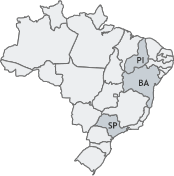
Contractor places bet on mining
Businessman Olacyr de Moraes, who is active predominantly in civil construction and agribusiness, decided to place a bet on mining by means of Itaoeste, a company initially organized to exploit limestone reserves in Mato Grosso, and which went on to exploit other minerals.
The company, a holder of 160 thousand hectares of mining rights in the prospecting stage in the states of São Paulo, Piauí, and Bahia, has already made an important discovery: in Bahia it found a thallium orebody – the only one known in the southern hemisphere – a mineral of highly strategic importance and of great value. Thallium is contained in manganese and cobalt ore in a deposit located in Bahia. In addition, the company is prospecting a carbonatite area that contains phosphates and magnetite in the São Paulo municipality of Piedade, with a great potential. The company controls two large blocks of areas in Piauí: one in the state’s south where manganese and titanium will be exploited (also in the form of rutile) and another in the region of Guadalupe, where prospecting is in progress for attapulgite and iron ore associated with titanium. According to Carlos Cerri, Itaoeste's commercial director, the attapulgite area has already been prospected by Cetem and “interesting concentrations” were found. In addition to Piedade in São Paulo, the company controls other areas in the state’s south, more specifically in the Vale do Ribeira region, where gold and limestone for cement are being prospected. In Bahia where thallium was discovered, Itaoeste owns mining rights over 44 thousand hectares and its managers believe that this rare mineral’s potential is even greater, as the reserve discovered is only one of the areas for which a final prospecting report has been disclosed.
In order to implement exploration programs in the numerous areas under its control, in 2010 the company invested a total of US$ 5 million and the 2011 budget is being defined, but businessman Olacyr de Moraes has anticipated that programmed investments will average R$ 1 million monthly.
This businessman’s entry into the mining business is due to his activities in agribusiness. His company was looking for limestone to supply a mill owned by him in Mato Grosso and which produced limestone for agricultural use. Owing to his lack of experience in this field he entered into a partnership with an experienced mining engineer, Vladimir Aps, who was also involved in prospecting through his own company. Olacyr de Moraes explained that he was impressed by the existing potential in Brazil for iron, manganese, gold, and rare metals, chiefly in the country’s poorer regions such as the North and Northeast. Because of this he asserted his expectations in the mining activity, in which he invests “as much as possible.” However, this businessman is aware that he will need other partnerships for his ventures, as it is forecast that prospecting in all the areas under Itaoeste’s control will require funds in the region of R$ 200 million. Hence, he is open to the likelihood of associations with other corporate groups, domestic or overseas, with preference for people in the activity and who have funds, experience, and technology. Furthermore, Olacyr de Moraes does not rule out the likelihood of following in the steps of other companies, which offered shares in the Canadian stock market as a means of capitalizing, “We are open to all the possibilities offered by the market,” he asserted.
Priority for Thallium
In the meantime, the company’s priority is thallium, currently produced in China and Kazakhstan only and with a growing market, in addition to having a price deemed to be exceptional, as it was quoted at an average US$ 6 per gram in 2010. According to engineer Vladimir Aps, reserves of 60 tons were found only in the first area prospected in Bahia, equal to six times the world’s current production of roughly 10 tons.
In addition to investments in prospecting that resulted in this discovery, Itaoeste also funded a one-year effort to develop processes in the University of São Paulo Department of Mines and Petroleum’s Laboratory for Characterizing Materials, which led to separating the thallium from manganese and cobalt and production of manganese sulfate and cobalt oxide on a laboratory scale. According to Vladimir Aps, all the results were confirmed by another laboratory, which fact provided safety to the process.
Thallium is a mineral employed in the production of high-technology materials and is considered the best contrast element for cardiologic image exams. It is also an excellent superconductor, very efficient in transmitting electricity with minimal losses. “An HTS cable may replace the equivalent of a transmission line in a hydro plant, for example,” stated Aps. Furthermore, thallium alloys are able to directly convert heat into electricity and vice-versa. “These are materials capable of converting waste heat into usable electricity.”
Based on its reserves in Bahia, the company may begin the production of manganese sulfate, currently imported or produced in the state of São Paulo. The location of the source in Bahia is very favorable because of the region’s strong vocation for agriculture and the widespread use of manganese as a fertilizer. The company could supply the markets in Bahia, eastern Goiás, Tocantins, and southern Piauí, a region of expansion in agriculture.
With the carbonatite deposits in Piedade, Itaoeste will be able to start producing phosphates as well as iron in the form of magnetite, widely employed in sinterising powder for the production of parts for the automotive industry.
Rua Fidêncio Ramos, 160 – 2º andar – sala 211 – CEP: 04551-010 - Vila Olímpia – São Paulo - SP
Tel: (11) 3168-3705 | contato@itaoeste.com.br


